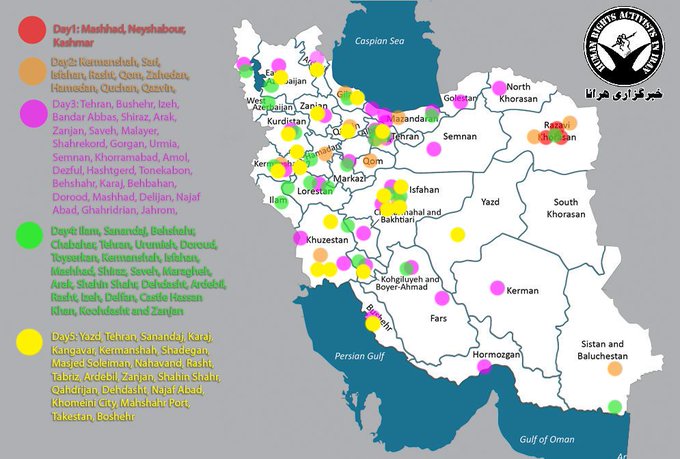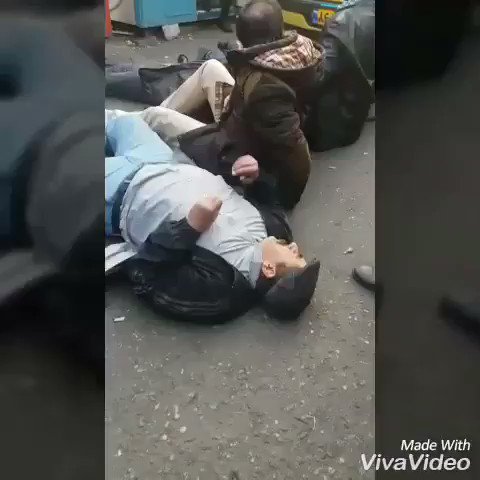By J. E. Dyer, LIBERTY UNYIELDING
The protests in Iran, now entering their sixth day, show no sign of abating. U.S. Ambassador Nikki Haley, our representative in the UN, made a superb speech at her press conference on Tuesday highlighting the sentiments and slogans coming from the Iranians themselves, and expressed America’s support for their yearning to throw off corrupt and tyrannical government. (Video below.)
A post by Adam Kredo at the Washington Free Beacon recounted comments from the Trump administration, which has promised to take a more rhetorically active posture than its predecessor did in 2009. This will be positive, given that the sheer scope of the uprising in Iran is being called unprecedented by Iranian observers. There could be a real possibility of reform for the Iranian people, and silence is not the right posture for America at such a juncture.
Neither is intervention in internal Iranian affairs. I haven’t heard a soul call for such intervention, nor do we have the slightest reason to expect the Trump administration to suddenly change its reflexively non-interventionist spots and start rooting around in Iran. That’s good news.
But there are things we can and should do, as well as things we shouldn’t.
What America should and shouldn’t do maps back to the two greatest needs in this situation. Those two needs are two sides of the same coin, in fact. We might call it the “Iranian people’s empowerment” coin, referring to how much the movement growing in Iran reflects the people themselves – as opposed to pre-organized factions jumping on the bandwagon of the uprising, or foreign state actors.
To express it succinctly, the Iranian people need empowering, and the predators need shouldering off. The window for the Iranian people, in the course of things, is likely to be a relatively short one – and not mainly because they themselves will need to get back to a normal life. It will be because of the other influences that want to shape the outcome in the huge geopolitical prize Iran represents. Money and arms, some from outside the country, will start to overwhelm the people’s ability to drive events and make themselves heard.
America should not take an activist role in terms of the internal politics of Iran. But there is literally no other nation with any hope of holding undue influences at bay, so that the Iranian people themselves can make decisions.
There are a couple of big “don’ts” we need to observe. We should not latch onto pre-organized factions and seem to back them as the key to reform in Iran. This includes expat groups as well as those inside Iran.
It appears to me that the Trump administration is set to handle this well. I recommend to other Americans, especially NGO spokespeople and those with a high media profile, that we avoid rushing to endorse specific groups and individuals at this early stage.
The same would obviously go for any endorsement of a form of government, including the reinstallation of a Shah. That is for the Iranians to decide. (I note that crowds in Tehran have reportedly been shouting in the last two days for a popular referendum, the implication being that it would be a referendum on the Islamic Republic. That seems like a positive sign, since it is a practical proposal: something that would be a next step.)
The other don’t is a related one. Don’t give the appearance of “Westernizing” the uprising, by trying to frame it in the terms of Western constructs, and the interests and politics of Europe and the United States. (That includes harping endlessly on the nuclear “deal.”)
The last thing the Iranians need is the discouragement of hearing us talk about their uprising in the tired terms of our current politics and issues. When we talk about it, keep observations short, general, and focused on basic principles of liberty, consensual governance, and civil rights.
Frankly, we couldn’t do much better than to follow Nikki Haley’s lead, and amplify what the Iranian people themselves are saying. If they shout it in the street in Iran, they should hear it quoted back to them in the world’s forums. They should know that their voices are being heard.
The big “dos” – what we should do – are the following. One, provide whatever help we can to make networked communication possible for the people inside Iran. That basic form of empowerment is not just to keep them in business. It’s to ensure empowerment is broad-based, and is less likely to become a matter of cabals forming around narrow-based, exclusionary communication networks. That is the path to hijacking a revolution.
Two, use our power to protect the status quo in the region. Make it clear that no disruption in Iran will become an opportunity for Russia or China (or radical Islamists, for that matter) to accelerate a new “Great Game” in South Asia. The Iranian people can make big changes, if they want, and no outside power can turn that into a regional free-for-all.
We must take a moment to point out that Iran is, inherently, a nation, with a national idea that goes back for many centuries. Her modern borders are a modern construct, but Iran is not Iraq, Syria, Yemen, Somalia, Sudan, Pakistan, or any of the other nearby regional nations in which there was little preexisting idea of nationhood or a unified culture before the colonial era.
Iran can significantly change her government without falling apart. It is profoundly wrong to suggest that ousting the mullahs would fatally destabilize the country or rip it apart in a geographic sense, sending floods of refugees hither and yon. The overwhelming majority of protesters are shouting for Iranian identity and nationalism. They aren’t trying to secede from Iran; they want to be able to respect and trust an Iranian leadership in Tehran.
If changing their government is what Iran’s people want, they should have the opportunity to do it, without railroading from outside actors. The United States can’t wave a magic wand to make this factor disappear, but we of all nations can mitigate it as a condition of the geopolitical environment.
Besides holding the line on the balance of power and lines of confrontation in the Middle East, one of the most important things we can do is keep an eye on the mullahs’ financial situation, and its impact on their power over the people.
I can recommend this useful tweet thread on Iran’s banking system, which provides a ready-room tutorial on how it is overleveraged with government debt, and mired in corruption, including literal theft from small account-holders by the big institutions – like the IRGC – over the last year.
Other resources to get you started are here, here, and here.
This is one reason the people are in the streets, but it’s more than that. It’s a key pressure point for the regime. The Iranian banking system needs shoring up, and quickly.
If the regime gets back-door assistance from outsiders (like EU nations, or Russia or China), it will be in a better position to ride out the popular uprising and repress the protests. Wherever the assistance comes from will also instantly become a factor in changing the geopolitical reality of the Middle East, against the general interest.
This – the regime’s financial stability, its access to cash, its ability to spend it on attacking its own people, and the incentive of other nations to leverage these concerns as a power move – is something the U.S. can address (behind the scenes, for the most part). We can’t fix or control all of it. But we can make a difference.
Finally, the biggest “do” is to continue speaking up for the Iranian people. They are throwing their own bodies down to block the streets around Evin Prison, and they are attacking banks associated with the IRGC, and trying to take down Basij watch stations and attack military bases, not because we think those entities are evil, but because they do.
Listen to them. Amplify their voices. If any people can make a go of effective regime change, in place, in triumph, charting a course to their own indigenous idea of nationhood, it’s the Iranians.











then It should be exposed and emphasized on social media.
The number one grievance that Iranians, religious or secular, had with the Shah, was that he was perceived as America’s puppet. National pride is their bottom line. Then and now. Trump is handling it just right.
The writer is both right and wrong. The US should, like he says, keep outside countries away from interfering in the internal matters of Iran. But he’s wrong about the “Westernising”. Beofre the Mullahs overthrew the Shah. Persia was the most go-ahead country in that region, strong admirers of the Western and United States way of life and rapidly transforming itself on that pattern. Had been for years.
So far the shooting has been all on one side, and the US should not, as he says select a group to endorse, but it would be no harm to show a blind eye to some international arms dealers who might like to contact and deliver weapons and munitions to the anti-mullah movement, which is otherwise basically helpless against military power if ruthlessly used, which could be the mullahs’ next move.
Just my spontaneous opinion, not deeply thought out.